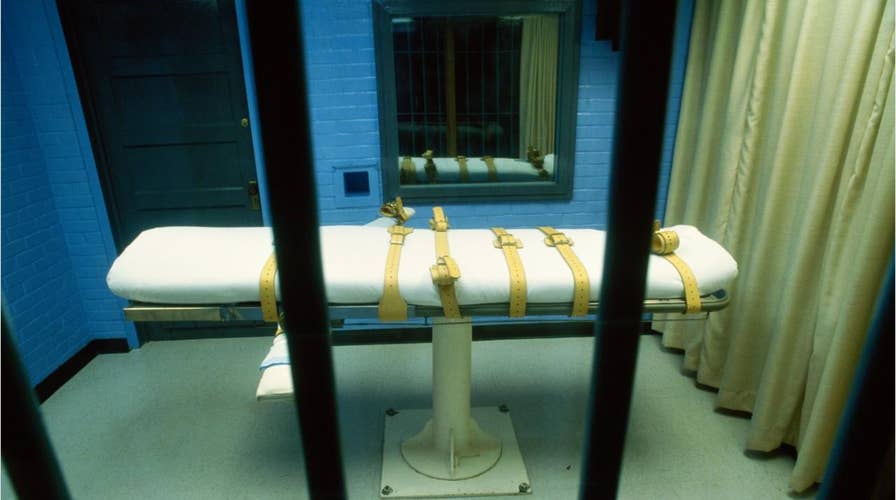Federal government to resume capital punishment for first time since 2003
Attorney General Bill Barr announced the federal government will resume capital punishment and plans to execute five inmates on death row for the first time since 2003.
The only woman on federal death row was set to be executed by lethal injection on Jan. 12, but Lisa Montgomery, 52, got a brief reprieve when, on Christmas Eve, a federal court pushed the date back.
The court claimed the January date violated federal regulations that establish procedures for carrying out capital punishment
Kelley Henry, one of the convicted killer’s attorneys, told Fox News she contracted the coronavirus in November when visiting Montgomery behind bars, setting back the preparation required to argue her last-minute clemency case. The legal team argues Montgomery suffers from a mental illness induced by a childhood of rampant rape and abuse.
"I have only been able to speak with [Lisa] on the phone [since contracting COVID-19]. Her illness is such that it waxes and wanes, and she is trying the best she can," Henry, a Nashville public defender who has taken on Montgomery's case along with Amy Harwell, told Fox News. "She is on suicide watch and has been issued the highest mental health designation."
The execution date, originally set Dec. 8 before it was delayed a month, remains in limbo as activists add their voices.
LISA MONTGOMERY'S EXECUTION NOW SET FOR JAN. 12, GIVING TIME FOR CLEMENCY APPLICATION

Lisa Montgomery, 52, is the only woman lingering on federal death row was set to executed by lethal injection on January 12. But on Christmas Eve, a federal court put on a halt on the forthcoming date, claiming that it violated federal regulations constituting procedures for carrying out capital punishment. (legal team (handout))
Henry said the U.S. government has since appealed the order vacating the date, and if successful, the date will be put back in place 20 days from the day of designation. It could be appealed again and end up on the Supreme Court docket. If it does go forward, Montgomery will be the first female death row inmate put to death since 1953.
The crime was akin to the plot of a horror movie, set in the sleepy Missouri town of Skidmore in late 2004. The then-36-year-old, Kansas-based Montgomery met Bobbie Jo Stinnett, a 23-year-old dog breeder, in an online chatroom called "Ratter Chatter."
At the time, Stinnett was talking to prospective buyers for a terrier and happened to mention she was eight months pregnant. Montgomery, under the customer name Darlene Fischer, claimed she too was expecting – generating an email exchange that led Montgomery to schedule a visit to Stinnett's home over state lines to view a pup.
Unknown to Stinnett, Montgomery had undergone sterilization after the birth of her fourth child.
On Dec. 16, 2004, Montgomery entered Stinnett’s home and strangled the 23-year-old woman and proceeded to carve out the premature baby from her womb with a kitchen knife. At one point, Stinnett is said to have woken from her unconscious state and attempted to fight back, only to be strangled to death.
Sightings and anecdotes of Montgomery parading the baby girl in a Winnie the Pooh outfit about town quickly emerged. Montgomery told others from church that she delivered her baby at a women's center in a nearby Kansas town and that she had given her the biblical name of Abigail.
Stinnett's lifeless body was discovered by her mother, Becky Harper, about an hour after the assault – and a frantic search for the tiny baby commenced. The following day, after forensic computer scientists traced the online communication between the women, Montgomery was arrested at her home in the 385-person town of Melvern, Kansas, where the newborn was also recovered.
The baby girl survived and was placed in the care of her father. She would now be 16 but has lived a quiet life removed from the public eye. Her mother was laid to rest in Skidmore.
TEXAS FATHER SHOOTS, KILLS INTRUDER HOLDING 2 CHILDREN AT GUNPOINT
Meanwhile, much of Montgomery's history had been pockmarked by peculiarities and poverty.
At the time of the murder and fetal abduction, Montgomery lived in a farmhouse on the edges of Melvern with her husband, Kevin. Locals said she often proclaimed to have been pregnant, only to later say that she had lost the baby. Montgomery worked at a takeout pizza place while at the same time raising livestock and hand-spinning wool on their property.
But as the heinous case churned through the courts, experts now vow that her court-appointed defense did not aptly illuminate the extent to which Montgomery suffered from mental illness and a life of falling through societial cracks out of fear it would make her look worse.
Unable to afford a private lawyer, Montgomery was initially appointed Judy Clarke, a California attorney who specialized in death penalty cases involving people with severe mentally illnesses. Clarke had successfully negotiated plea agreements that spared the death penalty for the likes of Atlanta Olympics bombing mastermind Eric Rudolph, "Unabomber" Ted Kaczynski and, more recently, 2011 Tucson mass shooter Jared Loughner.
However, Clarke was removed from the case with a judge's approval after a male public defender on the team wanted to opt for a different defense strategy and peg the blame on another relative. That dissipated when the relative produced an alibi.
According to Henry, the removal of the experienced – and only woman – on the defense team marked the beginning of the end for Montgomery's chance of not being given a death sentence.
"People often get [the death penalty] not for the worst crime, but for having the worst lawyer," Henry said. "That is absolutely true in Lisa's case."
Throughout the trial, only slices of an anguished upbringing were bought to light. A federal prosecutor said that Montgomery was "obviously insane," and a psychologist recommended she be admitted to a psychiatric facility.
Nonetheless, both federal prosecutor Roseann Ketchmark and the opposing expert witness forensic psychiatrist Park Dietz vehemently countered the diagnosis of pseudocyesis. It was determined that Montgomery did not fit the archetype for such a condition.
Dietz told Fox News that he is not free to speak about Montgomery other than to repeat what he testified to in the guilt phase of her trial, effectively refuting the insanity claim.
Montgomery was sentenced to death in 2007.
"The case has finally come to a close, but we will never stop missing Bobbie Jo," Stinnett's teary mother, Becky Harper, said in an ensuing press conference. "She was a sweet and loving wife, daughter, and sister and would have been a wonderful mother."
Harper did not respond to a request for comment regarding Montgomery's case.
NEW 'SQUAD' MEMBER WANTS CLEMENCY FOR EVERY DEATH ROW INMATE
While the jury was never shown MRI scans of Montgomery's brain, images issued to Fox News by Montgomery's current legal team show tissue loss in her parietal lobe and limbic structures, as well as enlarged ventricles, which can signal brain damage. PET scans also feature an anomalous pattern of cerebral metabolism indicative of brain dysfunction.

As the heinous case churned through the courts and for haunted American audiences across the country, experts now vow that the extent to which Montgomery suffered from mental illness and a life of falling through society’s cracks was not aptly illuminated by her court-appointed defense out of fear it would make her look worse. (lawyer handout)
Given her pending execution, which was announced by the Department of Justice (DOJ) in October, renewed attention has been placed on Montgomery's history.
Her older half-sister Diane Mattingly recalled that Montgomery had endured years of sexual, physical, verbal and psychological abuse – how her stepmother tossed the small girl outside naked and compelled her to eat raw onions. Mattingly remembered the restless nights in which Montgomery was allegedly raped by her stepmother's partners and their friends.
More family members have come forward with chilling narratives of Montgomery allegedly being gang-raped for hours on end by her stepfather and his friends, beating and urinating on her when they were done.
Montgomery was also said to have been prostituted by her alcoholic mother, who pocketed money from at least two men at her daughter's expense. Deeper psychological scars were inflicted with "punishments" such as being pummeled black and blue and made to stand in a corner for hours. At one point, the mother is documented to have killed the beloved family dog in front of the children, court documents show.
It was also reported that a police officer, a judge and a school administrator had been notified that, as a young girl, Montgomery was the victim of abuse. She was placed in a special needs class in middle school given her struggles and apparent dissociation, but no concrete action to help her was taken. Montgomery also confided in a cousin that, as a teen, a deputy sheriff and his friends had raped her – amplifying a profile of a girl failed by the systems designed to protect the vulnerable.
Montgomery's nightmare existence extended into adulthood.
HOW PRESIDENTIAL PARDONS REALLY WORK: AN INSIDE LOOK AT THE FACTORS THAT GO INTO IT
Henry affirmed that Montgomery has a host of mental health woes – from bipolar disorder, temporal lobe epilepsy, and complex post-traumatic stress disorder to dissociative disorder, psychosis, traumatic brain injury and possibly fetal alcohol syndrome.
Montgomery's ongoing plea for clemency has also been taken up by a team at The Cornell Center on the Death Penalty Worldwide, which has pointed out that at least 16 other women were convicted of murder while carrying out a fetal abduction in the U.S. Montgomery is the only person who was placed on death row.
More than 140,000 people have signed a petition urging the White House to stop the execution, while the Inter-American Commission on Human Rights has additionally called on the U.S. government to issue a commutation.
Since Montgomery was informed of her execution date more than two months ago, she has been moved into the Bureau of Prison's suicide watch cell, where she is watched 24 hours a day in a frigid cell with constant bright lights, Henry said.
The lawyer also noted that the around-the-clock monitoring means Montgomery is even watched on video camera going to the bathroom, a troubling and retraumatizing notion.
CLICK HERE FOR THE FOX NEWS APP
Nonetheless, Montgomery's legal team is not trying to free Montgomery from prison, but pushing for the death sentence to be commuted to life behind bars.
If Montgomery's execution – inmate number 11072-031 scheduled at the U.S.P. Terre Haute in Indiana – does move forward, she will be the fourth person executed by the Trump administration in his lame-duck period.
The U.S. federal government has executed only three women: In 1865, Mary Surratt was hanged for partaking in the conspiracy to assassinate President Abraham Lincoln. In 1953, Ethel Rosenberg was executed on the electric chair following a spying conviction on behalf of the Soviet Union. Later that same year, Bonnie Heady was executed via a gas chamber for abducting and murdering a 6-year-old boy.
Montgomery is currently incarcerated at Federal Medical Center, Carswell, in Fort Worth, Texas.










































